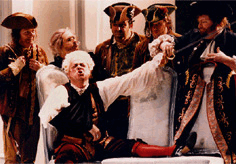
Inaugural Class of 2002
Eric Halfvarson
Performing Arts - Opera Singer
Internationally prominent bass opera singer
Performances with the Metropolitan Opera of New York, the Lyric Opera of Chicago, the Bayreuth Festival, the American and Italian Spoleto Festivals, the BBC Proms, the Amsterdam Concertgebouw, and many others
Featured on recordings by Erato, New World Records, and EMI
Eric Halfvarson was destined to be an opera star. When he was so small that he had to reach up to touch a piano keyboard, he would ride his tricycle around in circles on the family driveway in Aurora, Illinois, singing large portions of the soprano aria "Rejoice Greatly" from The Messiah by Handel. His mother, Lucille, a singer, voice teacher, choral director and conductor would have been practicing in the music room of the family home, and the tot Eric would have been listening with the receptive ear that marks a true musician. Life in the Halfvarson home revolved around music. Eric remembers sitting uncomfortably in the bleachers of the West Aurora High School gym, enthralled by the high school choral concerts his father, Sten, would conduct. And he remembers the rhythms of the liturgical year, whose great musical peaks at Christmas and Easter spurred so much activity in a household where the parents also directed church and festival choirs.
The family also had a strong love of nature and the four children (he has three sisters -- Laura, Linnea and Mary) would revel in their annual August adventures in a log cabin in Hayward, Wisconsin, where fishing and hiking would rule their days. It is still a family getaway.
The boy Eric, lashing bushel baskets to his sled for the morning paper route, or walking to Freeman Elementary or Jefferson Middle School and staring up at the breathtaking canopy of snow-encrusted old elm trees, could not have forseen his later life lugging heavy baggage through the airports of the world, or singing in the greatest opera houses under dazzling stage sets. Rather, he struggled to find his musical niche. Uninspired by the piano, he turned eagerly in the fourth grade to the world of band. The clarinet at introduction night buzzed and tickled, he remembers, and the slide on the trombone went flying across the room. Fortunately, his distress melted away at his first note on the French horn and a horn player was born. For the next fifteen years he considered himself primarily a hornist.
In Aurora he studied with former Hall of Fame board members George Peichl and G. Edward Nelson, and had to have a large bicycle with large baskets in order to transport the horn, at least until he could drive the family car to his lessons across the river. He studied for a time with the renowned Dale Clevenger of the Chicago Symphony Orchestra and by high school was himself giving French horn lessons.
In school, however, Eric's first love was science. Growing up, he had a little science lab in the basement, where, he says, he "fooled around with various crazy ideas". But "mostly it was a place to dream," he says now, and after graduating West Aurora High School in 1970, he entered the University of Illinois in the physics program. It was in college that he began to understand that it was music, not physics, that was in his bones, and he switched his major to music education. By his junior year, with his horn sitting in the closet more and more while he sang, Eric began to realize that a career as a singer might be in his cards.
Eric switched his major to music performance and mined the rich resources of the University of Illinois voice department, studying with Mark Elyn, John Wustman and David Lloyd. Although the bass voice is the slowest to mature, he flourished in his vocal studies and soon made his professional debut in 1972 with the Lake George Opera Company, singing the part of Don Basilio in "The Barber of Seville.” He later received his master's degree from the University of Illinois, and by 1977 was touring as Figaro in "The Marriage of Figaro" with the Texas Opera Theater. He debuted with The Lyric Opera of Chicago in 1979, in Prokofiev's "The Love For Three Oranges" and then moved to New York City, where he affiliated with Martha Munro as his artistic manager, and sang thirty auditions in the first two months.
As a young professional Eric sang with numerous American and Canadian opera companies, becoming known especially as an interpreter of Strauss roles such as Baron Ochs in “Der Rosenkavalier,” Henry Morosus in “Die Schweigsame Frau” and La Roche in “Capriccio.” He sang with the Canadian Opera, Opera Hamilton, the Edmonton Opera, the Calgary Opera and L'Opera Montreal. In the United States he performed with the Santa Fe Opera Company, the Houston Grand Opera, the Dallas Opera, the Florida Grand Opera, the San Francisco Opera, the Los Angeles Opera and Opera Pacific.
He debuted with The Metropolitan Opera of New York in 1992, singing both Baron Ochs in “Der Rosenkavalier” and “Sarastro in Die Zauberflote.” Since then he has appeared often at the Met. In 1993 he debuted with the Bayreuth Festival in the new Ring cycle directed by James Levine. He also debuted that year with the Berlin Staatsoper, and the following year with the Bayerische Staatsoper in Munich. He frequently performs at the Vienna Staatsoper.
Eric’s roles run the gamut of opera, from modern works such as “Billy Budd,” “Antony and Cleopatra” and “The Aspern Papers” to the classic operas such as “Aida,” “Rigoletto,” “Il Barbiere di Seviglia,” “La Gioconda,” “Don Carlo,” “Macbeth,” “Semele,” “I Masnadieri,” “Arabella,” “La Boheme,” “Goetterdaemmerung,” “Das Rheingold,” “Die Walkuere,” “Lohengrin,” “Tannhauser,” “Die Fliegende Hollander,” “Siegfried,” “Ariadne auf Naxos,” “Der Schatzgraeber,” “Oedipus Rex,” “Tristan und Isolde,” “Fidelio,” “Boris Gudonov,” “Eugene Onegin,” “Prince Igor,” “Faust,” “Manon,” and many more.
He has performed in operas at the Bastille and the Chatelet in Paris and in other cities worldwide, including Montpellier, London, Amsterdam, Hamburg, Florence, Venice, Valencia, Barcelona, Madrid, Bogota, Buenos Aires and Caracas.
In addition to grand opera, Eric has performed on the concert stage with orchestras that include the Chicago Symphony, the Boston Symphony, the St. Louis Symphony, the London Philharmonic, the American Symphony Orchestra, the Edinburgh Festival, the Amsterdam Concertgebouw, the San Francisco Symphony, the Halle Orchestra (Manchester, England), the American and Italian Spoleto festivals, the Columbus Symphony, the Dallas Symphony, the Minnesota Orchestra, the BBC Promenade, the National Symphony, the Ulster Orchestra (Northern Ireland), the Cologne Philharmonic and the Orquesta Sinfonica (Seville, Spain), among others.
The life of an international opera star keeps him crisscrossing the globe twelve months of the year. Eric speaks German fluently and also Italian and French, and works on his Spanish, Catalan and Russian. His demanding schedule requires him to stay healthy and fit, and he has developed an in-the-hotel-room workout that includes 100 push-ups and 200 crunches every day. "I have to stay strong," he observes with a sly smile, "in order to kill the tenor on stage. Which I never mind doing, because tenors make more money than basses. And they usually get the girl."
He has toyed with the idea of retiring from performing and taking up residence somewhere to teach. But he feels a strong responsibility to use his God-given talent in performance, and he is booked four years into the future. "I guess I'll just have to buy a new suitcase," he sighs.
He is passionate about encouraging young people to find a goal that is worthy and then to commit themselves to achieving it. "In our popular culture today," he says in his incredibly deep and silky voice, "we have abandoned the search for the best of the best. Anything, as long as it sells, is ok. I am terribly concerned that future generations will be much poorer because of this attitude."
Of course, singing is the worthy goal that Eric Halfvarson loves best. "Singing is such an intimately personal thing," he says with earnest warmth. "After all, your voice is inside your body. I want to convince young people that to find the individual expression of yourself through singing is a wonderful thing. You don't need to become an opera singer. Perhaps for you it will mean just having a better appreciation of singers. But to work at becoming the best singer you can be - that is priceless and unbelievably rewarding."
His complete devotion to his art has cost Eric much. Family visits can be difficult to arrange. He is usually working on several roles at one time. He has studied pantomime, Kabuki theater and martial arts, and he says that he cannot begin to really sing a part until he has figured out how the character walks. He falls into a semi-meditative state when preparing a role, so that he can imagine every nuance of action and music on the stage.
"And then, when I step beyond the proscenium, onto the stage," he says, "it's like entering the field of battle. Time speeds up to a thousand miles a second, and I struggle against the resistance of variables and the twists and turns of the performance." He might be engaged in swordplay (with the tenor, of course) and have to adjust to props fallen out of place and an unexpected whim of the conductor changing the tempo. All the while putting out great waves of perfect sound from his entire body to fill an opera house. "You definitely need to have the heart of a warrior," he says, "to sing opera. But every night in opera is a creative work between audience and artist. We enter together into the work, and at the end of the evening, everyone has learned something and received something."

